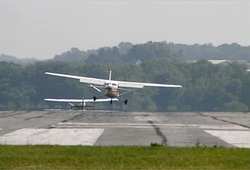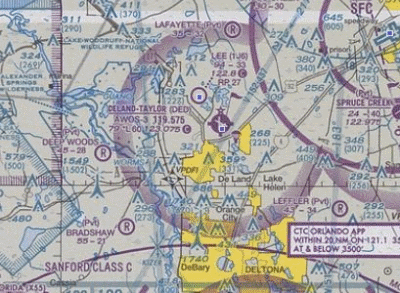Sat, Sep 21, 2024
New Trend Out to Cause Safety and Privacy Concerns
The trend of private companies monitoring landings using open-source data and optical capture seems to be on an uncontrolled rise. Scheduled flights? Check. Impromptu hops? Check. No transponder? No problem. They’re poised to track your every move -- because who wouldn’t want to pay an extra fee just to stop flying?

Landing fees aren’t a new feature at major commercial airports, but the same story doesn’t apply to general aviation (GA) fields. Many GA airports have relied on fuel flowage, tie-down, and ramp fees as their primary means of generating income. This was largely due to the perception that landing fees would deter pilots from using smaller airports.
However, an alarming amount of GA fields have started implementing landing fees recently. The latest among these was Florida’s DeLand Municipal Airport, which would have become effective on October 1, 2024, and required a $3 payment per 1,000 lbs of the aircraft’s max landing weight -- if it hadn't been voted down at the last minute. DeLand officials claimed that this was to prevent unsafe levels of traffic pattern saturation as nearby airports introduced similar fees.
“A preliminary review of available budgets suggests the airports are already operating at minimal expense to local taxpayers and receive federal grants that cover 90 percent of the cost for various projects,” one aviation organization opined. “Yet they are rushing to finalize local approvals required to implement landing fees…”

The implication of landing fees sets a disturbing precedent that penalizes the very act of flying. Especially for new pilots, being able to land at airports other than home base is an essential part of skill mastery. There’s also the fact that setting automatic landing fees is an unnecessary invasion of privacy and a safety hazard for GA pilots.
The EAA Government Advocacy staff recently released a statement on this issue, stating: “We have no problem with funding the infrastructure we use, but not in the form of à la carte fees that disincentivize the use of certain parts of the infrastructure and could affect safety as well."
The GA community plays a crucial role in advocating against landing fees, ensuring that our skies remain as limitless and unburdened as possible.
More News
Its Offerings Are Lighter, Cleaner, and Now Pushing Past 1,000nm on SAF Jet Fuel DeltaHawk’s diesel-powered aircraft lineup has seen incredible upgrades over the last few yea>[...]
The Airplane Experienced A Total Loss Of Engine Power On December 3, 2025, about 1600 central standard time, a Mooney Aircraft Corp. M20K, N57229, was substantially damaged when it>[...]
Make Sure You NEVER Miss A New Story From Aero-News Network Do you ever feel like you never see posts from a certain person or page on Facebook or Instagram? Here’s how you c>[...]
Aero Linx: European Society of Aerospace Medicine (ESAM) As a pan-European, independent forum, it works to promote the safety and health of all persons involved in aviation and spa>[...]
“We are excited to see Wisk achieve this milestone, and I’m so proud of the team that made it possible. The team at Wisk has built advanced technologies across flight c>[...]
 Aero-TV: DeltaHawks Diesel Power Steps Into the Spotlight
Aero-TV: DeltaHawks Diesel Power Steps Into the Spotlight NTSB Prelim: Mooney Aircraft Corp. M20K
NTSB Prelim: Mooney Aircraft Corp. M20K ANN FAQ: Turn On Post Notifications
ANN FAQ: Turn On Post Notifications ANN's Daily Aero-Linx (12.20.25)
ANN's Daily Aero-Linx (12.20.25) Aero-News: Quote of the Day (12.20.25)
Aero-News: Quote of the Day (12.20.25)




